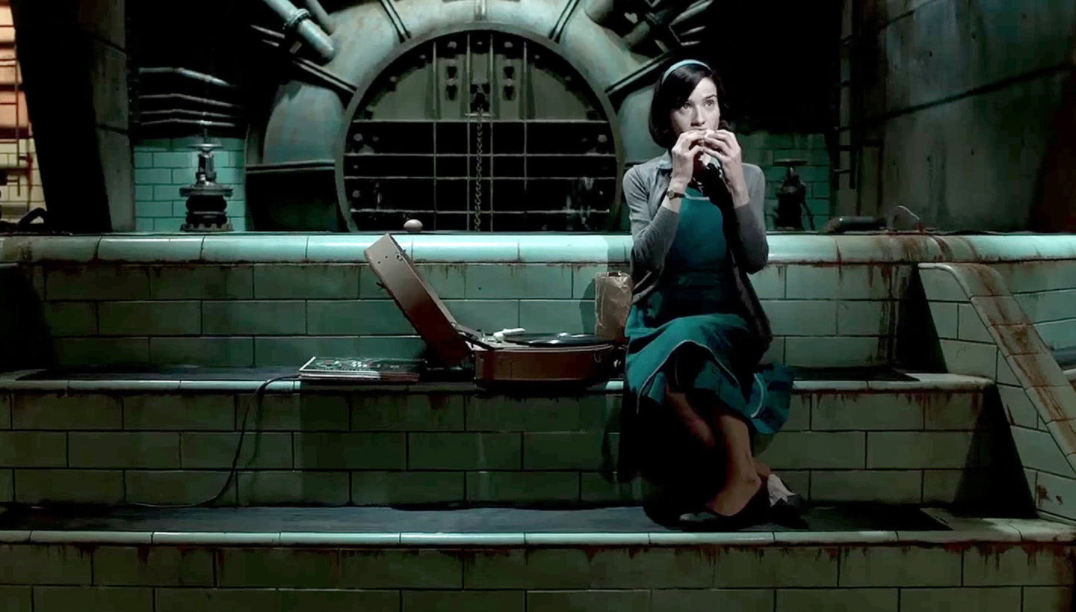Because Get Out winning Best Picture would have been far too political a choice (and also would have meant that Allison Williams had starred in an Oscar-winning feature), the Academy opted to go with the second most politically-charged film of 2017–albeit with more subtle undertones than the former–The Shape of Water.
The story of a man-fish that serves as something of a Creature From the Black Lagoon redux, Guillermo Del Toro’s latest showcase of the whimsical and fantastical, as usual, possesses a dark, ominous edge. One that pertains heavily to being daily spurned by society and its automatons, especially if you are anyone who falls under the classification of “different.” So naturally, the narrative takes place in the early 60s, the height of 50s McCarthyism runoff where our simple heroine leads a life of quiet desperation in Baltimore. Elisa Esposito (Sally Hawkins) is nothing if not “different,” a mute cleaning woman who was orphaned after being found by the river as a child with mysterious wounds on her neck.
Her sole source of companionship comes in the form of two other marginalized “types” of the time: her gay next door neighbor, Giles (Richard Jenkins), and her black co-worker, Zelda (Octavia Spencer). And though these two provide a great source of comfort and commiseration, Elisa still can’t help but feel as though she is missing something–someone–who will truly see her as she is. For isn’t that what true love is–to be seen? And then, one day, along comes The Asset (Doug Jones), who proves to be just that (and have just that, as well–just look to the dildo made in his honor) to Elisa.
So commences one of the (so far) great love stories of the twenty-first century set in the twentieth century (the other might be Phantom Thread), “great” because we’re still conditioned to believe that all worthwhile love must be rife with obstacles to overcome in order to finally be fully “possessed.” And while some might be shaking their heads over the Academy’s selection of a film that could never overtly come out and say: yes, this is about being cast off by society, yet still having something they want to extract from you–being both a value and a danger for your “weirdness”–it shows grand progress for a guard this old. After the disappointments of the Golden Globes, it seems apparent that the Academy Awards sought to prove to the members of the Hollywood industry and those who inexplicably continue to place importance on what they do that things are, in fact, changing. But as with all long-standing change, it tends to come gradually. Which is precisely why The Shape of Water is the most perfect and natural fit for winning Best Picture this year. And though Moonlight might have been the first “woke” statement the Oscars wanted to make with its Best Picture selection, it was, as we all know, notoriously bungled by La La Land last year (but at least Beatty and Dunaway were game enough to show up again this year to accurately declare the winner). And this faux pas put a palpable damper on the significance of the win, instead imbuing it with the symbolic oversight that whites so often seem to make. Ah, and speaking of that bland color, Tiffany Haddish and Maya Rudolph were there to remind us of the #OscarsSoWhite backlash from 2016 with the quip that the presence of both of them on stage probably had some viewers thinking: “are the Oscars too black now?” The answer to that question might have been a resounding yes for too many people had Get Out managed to win beyond the Best Original Screenplay category. And so it goes that The Shape of Water, while not necessarily the most obvious option for politicking toward more diversity in film, is, in fact, a sign that Hollywood’s stodgier institutions are ready to let go of what they’ve clung to for so long: “normalcy.” Which is, thank fuck, why Three Billboards Outside Ebbing, Missouri did not achieve the same sweep as it did at the Golden Globes.






















